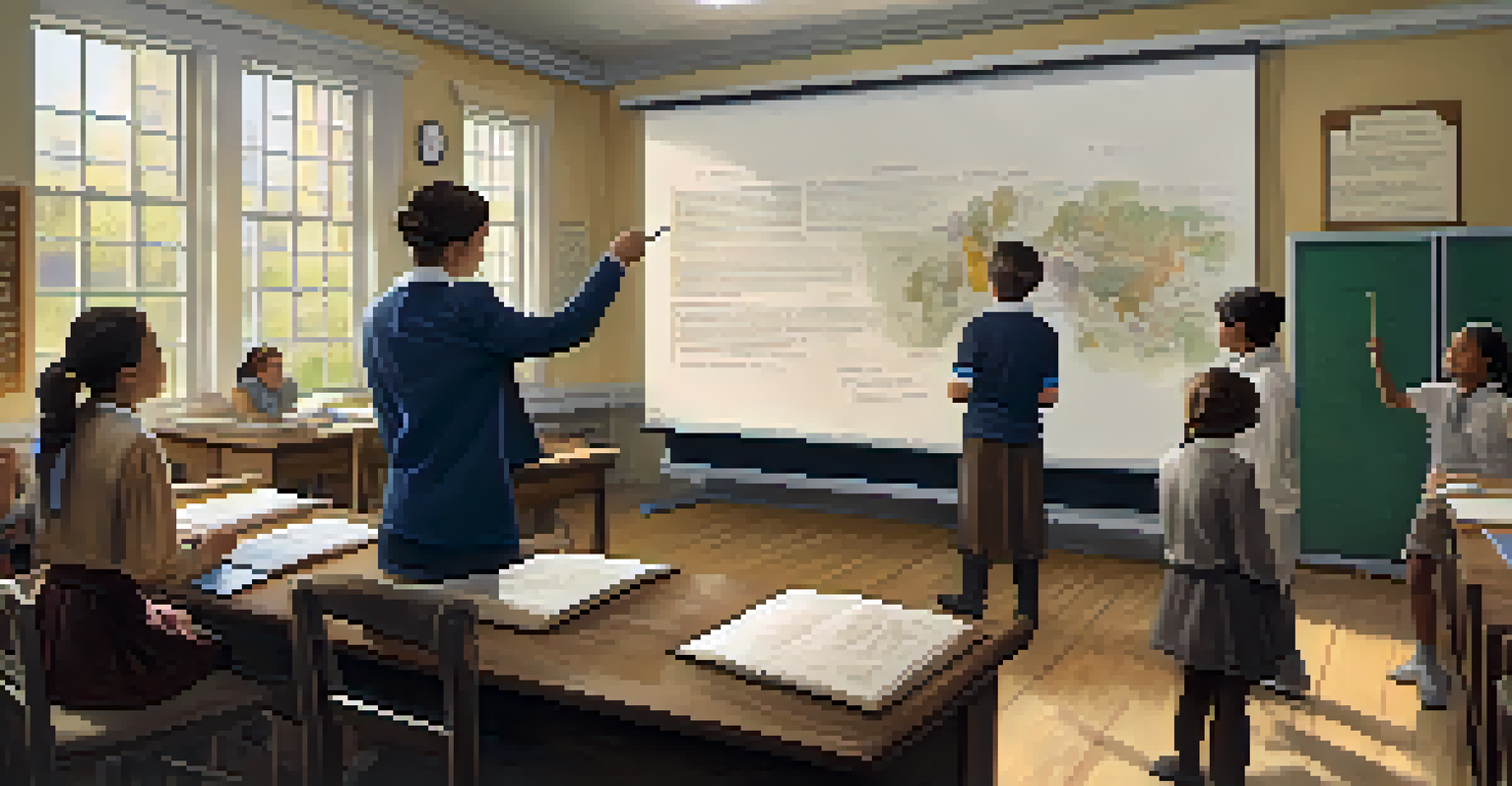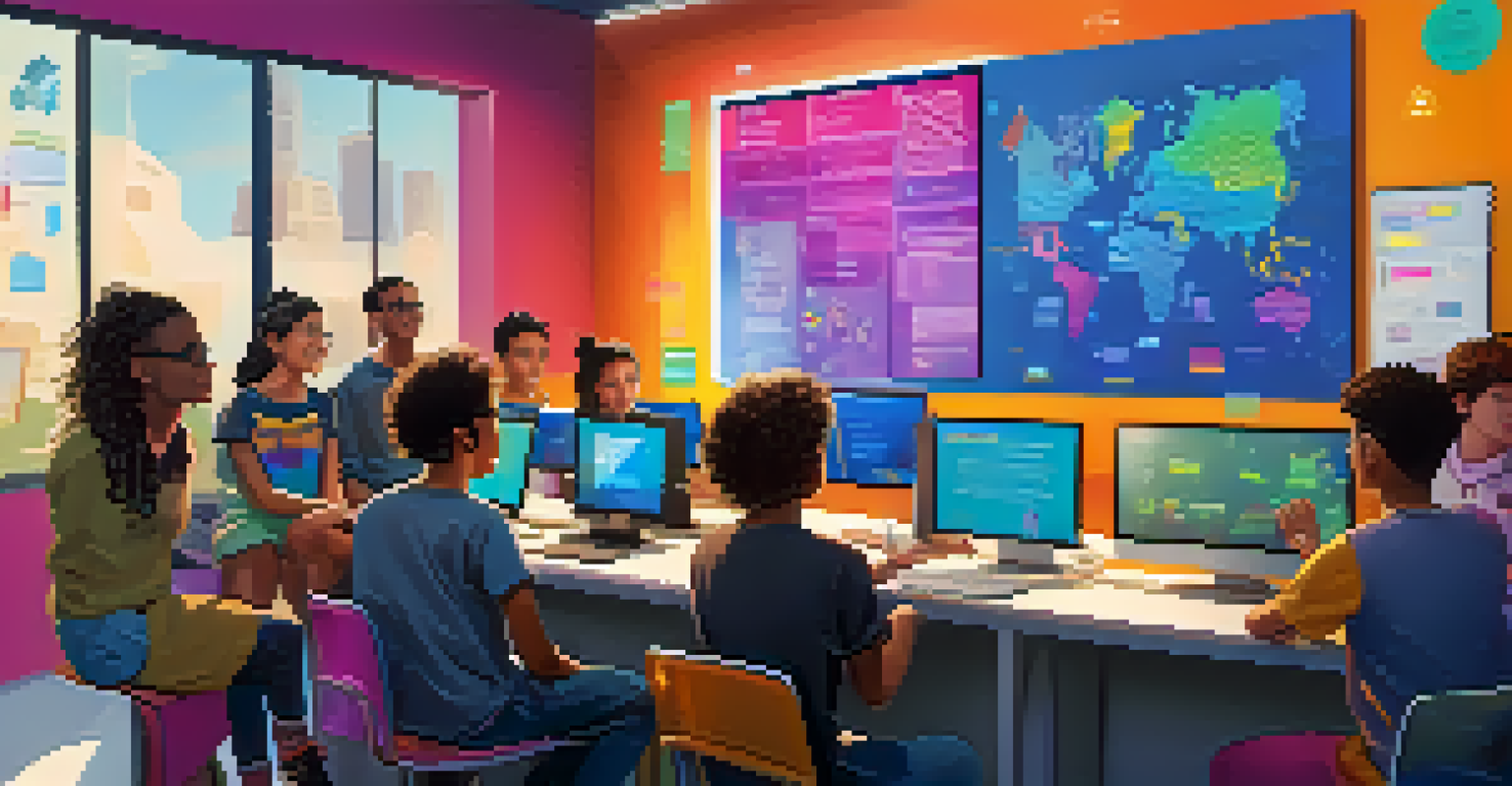Inquiry-Based Learning for Gifted and Talented Students

Understanding Inquiry-Based Learning
Inquiry-based learning (IBL) is a dynamic classroom approach that encourages students to ask questions and explore topics deeply. Unlike traditional learning, where information is often delivered directly, IBL fosters curiosity and critical thinking. This method allows students to take charge of their learning process, making it particularly effective for gifted and talented individuals.
Inquiry-based learning encourages students to ask questions and explore topics deeply, fostering a love for learning.
Gifted students often have a natural inclination to explore subjects in greater depth. IBL aligns perfectly with this trait, as it encourages them to pursue their interests through inquiry and investigation. By engaging in hands-on activities and real-world problem-solving, these students can connect theoretical knowledge to practical applications.
Moreover, IBL nurtures essential skills such as collaboration, communication, and creativity. As gifted students work together to solve problems or conduct research, they learn to articulate their ideas, respect diverse perspectives, and think outside the box. This collaborative aspect of IBL not only enhances their academic experience but also prepares them for future challenges.
Benefits of IBL for Gifted Learners
One significant advantage of inquiry-based learning is that it caters to the unique needs of gifted students. These learners often thrive in environments where they can explore topics that matter to them personally. IBL allows them to delve into their interests, which keeps them engaged and motivated to learn.

Additionally, IBL promotes self-directed learning, a crucial skill for gifted individuals. It empowers them to set their own goals, ask meaningful questions, and seek answers independently. This autonomy not only boosts their confidence but also fosters a lifelong love for learning.
Inquiry-Based Learning Encourages Curiosity
IBL fosters a learning environment where students can ask questions and explore topics deeply, enhancing their engagement and critical thinking.
IBL also helps in developing higher-order thinking skills. As gifted students engage in inquiry, they analyze information, synthesize concepts, and evaluate solutions. These skills are not only vital for academic success but also invaluable in real-world scenarios where critical thinking and problem-solving are essential.
Implementing IBL in the Classroom
Implementing inquiry-based learning in the classroom requires a shift in teaching strategies. Educators need to create an environment that encourages exploration and inquiry, which often involves rethinking traditional lesson plans. Instead of a one-size-fits-all approach, teachers can facilitate learning by posing open-ended questions and providing resources for exploration.
The greatest gift is not being afraid to question.
A successful IBL classroom often incorporates project-based learning, where students work on extended projects that require research and collaboration. This approach allows gifted learners to pursue their interests while developing essential skills. For instance, a science project on renewable energy can lead to discussions about environmental impact, thus broadening their understanding of the subject.
Moreover, assessment in IBL should focus on the process as much as the final product. Teachers can evaluate students on their inquiry process, collaboration, and presentation skills. This holistic approach not only values creativity and innovation but also recognizes the diverse ways gifted students can demonstrate their understanding.
Challenges of Inquiry-Based Learning
While inquiry-based learning offers numerous benefits, it also comes with challenges. One common issue is the need for adequate training for teachers. Many educators may feel unprepared to facilitate IBL effectively, as it requires a different approach than traditional teaching methods.
Additionally, balancing curriculum standards with inquiry can be tricky. Teachers often face pressure to cover specific content, which can conflict with the open-ended nature of IBL. Finding a balance between meeting academic requirements and allowing for student-directed exploration is crucial.
Self-Directed Learning Empowers Students
Gifted learners benefit from IBL as it promotes autonomy, allowing them to set goals and pursue their interests independently.
Moreover, not all gifted students may thrive in an inquiry-based environment. Some may prefer structured learning, and it’s essential to recognize individual learning preferences. Differentiating instruction within an IBL framework can help address these variations and ensure that all students benefit from the approach.
Examples of IBL Activities for Gifted Students
There are countless ways to integrate inquiry-based learning into the education of gifted students. For instance, a class might embark on a group investigation of local ecosystems, allowing students to create hypotheses, conduct experiments, and present their findings. This hands-on experience not only sparks curiosity but also fosters teamwork and communication.
Another engaging activity could involve a historical inquiry project where students research a specific event or figure. They could explore primary sources, conduct interviews, and even create a documentary. This type of project allows gifted learners to engage deeply with the material, developing both research skills and a deeper appreciation for history.
In the realm of technology, students might design their own apps or games that address a social issue they are passionate about. This not only taps into their creativity but also teaches them valuable skills in coding, design thinking, and problem-solving. Such projects highlight the versatility of IBL, demonstrating how it can be applied across various subjects and interests.
The Role of Technology in IBL
Technology plays a pivotal role in enhancing inquiry-based learning for gifted students. With access to digital resources, students can delve into research from various perspectives and gather information efficiently. Online databases, educational platforms, and interactive tools allow for a richer exploration of topics.
Additionally, technology facilitates collaboration among students, even across geographical boundaries. With tools like video conferencing and collaborative platforms, gifted learners can work with peers from different backgrounds, enriching their inquiry experience. This global perspective can lead to innovative ideas and solutions.
Technology Enhances Inquiry Learning
The incorporation of technology in IBL provides access to diverse resources, facilitates collaboration, and personalizes the learning experience.
Moreover, technology can help personalize the inquiry process. Adaptive learning tools can cater to individual students' strengths and interests, allowing them to explore areas at their own pace. This personalized experience not only empowers gifted learners but also ensures they remain engaged and challenged.
Fostering a Growth Mindset in Inquiry Learning
A growth mindset is essential when implementing inquiry-based learning for gifted students. Encouraging learners to view challenges as opportunities for growth can significantly enhance their experience. This mindset fosters resilience, allowing students to embrace setbacks as a natural part of the learning process.
Teachers can cultivate a growth mindset by modeling curiosity and persistence. Sharing stories of their learning journeys, including failures and successes, can inspire students to take risks in their inquiries. Celebrating effort and improvement over mere achievement reinforces the idea that learning is a continuous journey.

Furthermore, integrating reflective practices into IBL can help students develop self-awareness about their learning processes. Encouraging them to journal their thoughts, successes, and areas for improvement can deepen their understanding of their growth. This reflection not only solidifies their learning but also instills a lifelong love for inquiry.